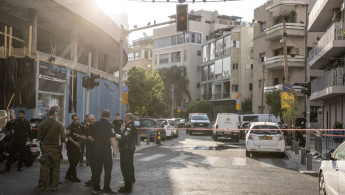Yemen's Houthis claim responsibility for Tel Aviv drone attack that kills one
Yemen's Houthi rebels claimed responsibility for a drone attack on Friday on the Israeli city of Tel Aviv that killed one person.
The rebels fired a "new drone called 'Yafa', which is capable of bypassing the enemy's interception systems", Houthi military spokesman Yahya Saree said in a statement on social media.
The Houthis have launched dozens of drone and missile strikes targeting shipping in the Red Sea and the Gulf of Aden since November in a campaign they say is intended to signal solidarity with Palestinians during Israel's war on Gaza.
The latest attack struck "one of the important targets in the occupied Jaffa region, what is now called Israeli Tel Aviv", the statement said, adding that "the operation has achieved its goals successfully".
The Houthi announcement came after Israeli police on Friday reported a powerful explosion at a building in Tel Aviv around 3am (12am GMT).
Police said a search after the attack revealed one man "dead in his apartment", bearing injuries caused by shrapnel.
Israeli emergency medical services said four people were taken to hospital with "relatively minor" injuries.
The Associated Press reported that local police in Tel Aviv said the explosion sounded at around 3:10am (12:10am GMT), reverberating to nearby cities and physically injuring at least 10 people.
The Israeli army said the blast was "caused by the falling of an aerial target", according to an initial inquiry.
A military official later told reporters that a "very big" drone was responsible. It was detected but the alarm was not immediately raised because of "human error", the official said.
"No sirens were activated," an army statement said, adding that the air force had "increased its air patrols in order to protect Israeli airspace".
The drone strike hit a part of central Tel Aviv near the US embassy.
The Houthis' military spokesman said last Saturday that his group "will not hesitate to expand its military operations… until the aggression stops".
The threat came after the Gaza health ministry said at least 90 people were killed and 300 injured in a strike on Al-Mawasi camp for displaced people.
Israel claimed the strike targeted Hamas military commanders behind the 7 October attack on southern Israel.
Commercial hub
The Houthis have previously alleged several attacks targeting the southern Israeli port city of Eilat, on the Gulf of Aqaba, but Friday's strike is the first operation claimed by the rebels against Tel Aviv, deep inside Israel.
The rebels on Friday declared the Israeli commercial hub "an unsafe area", saying it "will be a primary target within the range of our weapons".
Saree said the Houthis "have a bank of targets" in Israel, including "sensitive military and security targets".
They "will continue… to strike those targets in response to the enemy's massacres and daily crimes against our people in the Gaza Strip", Saree said.
In a separate incident on Friday, projectiles struck a container ship off the coast of Yemen without causing any injuries, an attack likely carried out by the Houthis, maritime security firm Ambrey said.
"A Singapore-flagged container ship was 'hit' by projectiles" 80 nautical miles (148 kilometres) southeast of the Yemeni port city of Aden, Ambrey said in an advisory, adding that no injuries were reported in the attack that is consistent with previous Houthi operations.
British maritime security agency UKMTO also said a "vessel has been hit by unknown projectiles" southeast of Aden.
"All crew reported safe. Authorities are investigating," said the United Kingdom Maritime Trade Operations which is run by Britain's Royal Navy.
Houthi attacks have prompted some shipping companies to detour around southern Africa to avoid the Red Sea, a vital route that normally carries about 12 percent of global trade, according to the International Chamber of Shipping.
Egypt's Suez Canal on Thursday reported a 23.4-percent drop in revenues attributed to disruptions in Red Sea shipping over the past year.





 Follow the Middle East's top stories in English at The New Arab on Google News
Follow the Middle East's top stories in English at The New Arab on Google News


